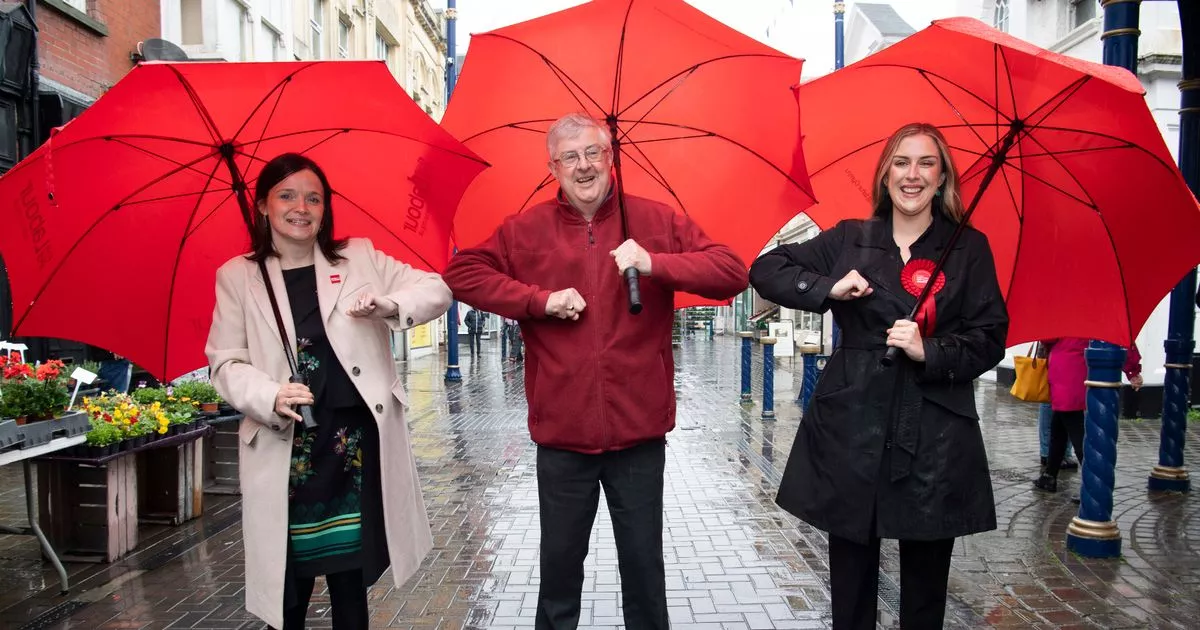Copyright dailypost

Scroll back to May 2021 and Welsh Labour were buoyant. The party has defied expectations - and polling - to secure 30 of the 60 seats at the Senedd election of that year. It was seen as tacit approval by a majority in Wales of the way First Minister Mark Drakeford had steered the country through the pandemic - although he was certainly not without his critics. But four years on and a recent ITV Cymru Wales, YouGov and Cardiff University poll has put their support at just 14% - down from nearly 40% on the constituency vote in the 2021 election. And this wasn't a one-off either - with previous polls showing a drop-off in support in the nation they've been in power in since the first Welsh Assembly in 1999. When you look for reasons why it is impossible to ignore the wider UK picture where concerns over illegal and legal immigration - as well as a general frustration with the mainstream political parties - has fuelled support for Reform, at the expense of Labour and the Tories. It is the same story in Wales with the Conservatives also floundering alongside their traditional rival, with just 11% in the same recent poll, down from around 25% at the last Senedd election. The difference on this side of the border is that Plaid are also eating up voters - going neck and neck in polling with Reform on around 30% each. This twin threat has seen Welsh Labour polling behind the wider UK Labour figure - something fairly unheard of in the nation of NHS founding father Nye Bevan. It's why this can't be dismissed as a blowback from the UK situation - with plenty of the responsibility for their current travails lying on the shoulders of politicians on this side of Offa's Dyke. So what went wrong? In some ways perhaps it was the unexpected success at the last election that led to over-confidence and complacency once the latest term got underway. After so long in power in Wales they could be forgiven for running out of ideas but they actually quickly set about making headline grabbing changes. The problem was the headlines were often negative. The government were only in place for a month when transport minister Lee Water announced the roads review - a comprehensive look at all new road projects - around 50 of them - to ensure they aligned with the country's climate and net-zero goals. It put the brakes on developments, with the first casualty the £14m Llanbedr bypass in Gwynedd, a road scheme the community has been crying out for decades and had been previously approved by Welsh Government. Sign up for the North Wales Live newsletter sent twice daily to your inbox Others followed with the north left feeling particularly hard done by as projects tumbled, from the removal of the A55 roundabouts to the third Menai crossing and Flintshire Red Route. This saw even loyalists like Ken Skates break ranks to criticise the decisions. The idea was to move Wales onto active travel and public transport but this came as Transport for Wales was performing badly in the wake of the pandemic and bus services still not a viable alternative in many areas. But it was another transport decision that created a backlash that will almost certainly reverberate into next year's election campaign. Twenty is plenty In September 2023 the default speed limit in Wales changed to 20mph - meaning a vast majority of previously 30mph roads suddenly had a new limit. It was only once introduced that people saw the scale of the impact. This was partly due to the failure of Welsh Government and a vast majority of councils to properly consider routes where the new 20mph was going to cause a major kick back, and to many simply felt intuitively wrong. Guidance was subsequently changed in a bid to appease the many critics and some councils have taken full advantage, but it's too little too late for many. The good news for the government is that the policy is delivering reductions in collisions, injuries and deaths which will have softened views. But there is still an anger over this policy - including with many previous Labour supporters in heartlands like north east Wales and the Valleys. What is telling is that most people in Wales are broadly supportive of policies to reduce the impact on the climate and would like safer roads for themselves and their families. But good politics is about bringing people along on the journey - not dragging them along. The failure to listen to concerns raised in the 20mph pilots ahead of the national rollout is an example that creates the feeling changes will be made regardless of what people think, rather than in conjunction with voters. Other policies have proved hugely unpopular with certain groups - from the visitor levy angering those in the tourism and hospitality sectors and proposed changes to farm funding causing a rural backlash. New leader/s Support was already ebbing away when First Minister Mark Drakeford called time as leader in December 2023. What followed was a disaster for Welsh Labour, both in terms of internal unity and the message this projected to the wider party and country. The run-off to replace Drakeford - between Vaughan Gething and Jeremy Miles - proved more bitter than these things usually are for a party that has managed to maintain a strong degree of unity over more than two decades. The donations scandal that dogged Gething proved impossible for him shake-off after winning the vote, and he resigned as leader just four months after taking the role - prompted by ministerial resignations that made his demise inevitable. While the increasingly divided party looked in crisis at this point these are the sort of phoenix from the ashes moments when they manage to reset, refocus, get back on track - and win elections. The next appointment was a compromise coronation with Eluned Morgan taking over. Perhaps aware of the administration's failings when it came to listening to the public she immediately went on a nationwide 'listening exercise'. With a friendly Labour government in Labour and a reset in Wales it looked like this could be the moment the party's fortunes begin to change. But the popularity of the Labour government in London and PM Keir Starmer has plummeted since the UK General Election and that has seeped through to Wales as Reform hoover up dissatisfied voters. Reform are very much political marmite and the problem for Labour in Wales is that those opposed to their brand of politics are drifting to Plaid, who are enjoying a surge in popularity. Recent polls are helping frame the narrative of the upcoming election as Plaid versus Reform. Welsh struggles It is also important to underline that through all this we have the NHS in Wales struggling to recover from the pandemic with long waits for treatment, be that for an operation or to be seen in an emergency room. It is a similar story with education, with already cash-strapped schools being forced to cut more staff. On the economy, Wales still lags most parts of England and has seen inactivity rates spike back up after the pandemic. So it's not like the Welsh Government can point to its own record to differentiate itself in a positive way from counterparts in London. At points like this the public will looks at every piece of "wasteful" spending and question why this money is not being focused on the core services Welsh Government has power over. It all adds up to a toxic mix for the party and time is running out for them to find the solutions. They've been around too long to write off but there's no indication that new leader Eluned Morgan has turned the ship around for the party. The number of leading members announcing that they're set to step down at the next election adds to an end of an era feeling. Unless there is another political earthquake between now and May 2026 the party looks set to lose its grip on power in Wales for the first time since devolution started back in the late 1990s. Join the North Wales Live WhatsApp community group where you can get the latest stories delivered straight to your phone



